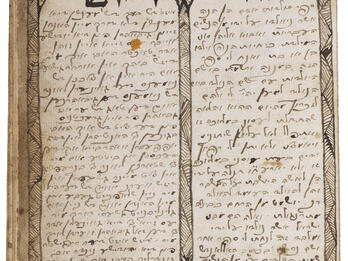Sefer yesh manḥilin (Those Who Bequeath)
Section 230
Behold, I am aged and my eyes are dim and my hands heavy and shaky, and at a time when my strength, enabling me to remain standing upon my watch, is ebbing away—with the yoke of the rabbinate to carry out my task. Moreover, the divine attribute of judgment has struck at me, and my splendor and glory were taken from me on the evening of Thursday, the thirteenth day of Tishri last; I have dwelt alone—my wife, who had been my crown of beauty and the treasured mistress of the household, died on me—and it is an amazing thing that Wednesday, the twelfth, was the occasion of the yortsayt of the precious jewel that had formerly been in my hand, the lady Esther—may her soul rest in Paradise—my beloved daughter, who was of such surpassing excellence; and thus I was left all alone, and what can we say? etc.; for by this Divine decree I was cut off—and I lovingly accepted everything decreed against me by Heaven, in the year five thousand five hundred and twenty, [1760]1 in my abundant sorrow, as having occurred on account of my own guilt. Accordingly I said to myself: “What is there for me here?” and I became minded to settle in the city of Fürth, the place where I had grown up, and thereby to fulfill the verse: “I shall lie with my forefathers,” in such manner as to be at table with one of our relatives, either with my brother’s son, R. Saadya Isaiah—may his Rock and Redeemer preserve him—or with R. Zalman Ber, the husband of my sister, the lady Gittel—long may she live—while I was still able to manage—with God’s help—being in a state of good bodily health, on just two or three gold coins from week to week, if God so willed it, for so long as the Almighty, blessed be He, has ordained that I remain alive and in fine physical health, with His assistance, blessed be He. And my son, the beloved of my soul, is in agreement concerning this, and, through God’s help, he is my glory and the one who raises my head. My heart tells me that the most excellent mind of my beloved brother-in-law, our noble Master, R. Leib Fürth of Vienna, will likewise be in agreement, and I am expecting his reply to my inquiry shortly, if the Almighty so wills it. Now that being the case, what difference does it make whether I am living here or there, since all that matters is for me to prepare myself and to write to my aforementioned relatives in Fürth?
However, all new beginnings are fraught with difficulty, and my heart is pounding in relation to this matter—to uproot myself from the place where, with God’s help, there is relief, and which is pleasant both toward Heaven and toward human beings, all of whom are beloved, and so forth, and to go to another place, which is wearisome, by reason of its great distance, and to sit at the table of others, and the like—and who knows what events a day may produce? However, may the All-Present cause everything to turn out favorably! Thus I said to myself that, in any event, I should seek the advice of the Master, the Rabbi—may the All-Merciful guard him and redeem him—as I had heard from his own mouth that his father-in-law, the illustrious head of the ecclesiastical court, the Maharitkh2 of blessed memory, was in the habit of seeking the counsel of a wise man who was straightforward in his ways, upon which he would rely. Hence I make enquiry of you, my esteemed brother—may the All-Merciful guard and redeem you—sage of perfection and man of truth; it will be regarded as the equivalent of someone inquiring of the Urim and Tumim, representing truth and perfection. Now there is one thing that I request, and that I seek, given that his wide-ranging mind is on the verge of agreeing to that fine proposal mentioned above, which is, from a rational perspective, the appropriate and correct way for me to go—with Divine assistance—at the time of my old age, as aforementioned; may my esteemed brother—may the All-Merciful guard and redeem him—kindly forgive me for requesting him to send an introductory message to my aforesaid relatives in Fürth on my behalf along the lines mentioned above, to prepare the goodly way before me in advance—that is to say, whichever way he deems most appropriate—on the basis that I need to have a special room for my own use, containing a bed, a table, a chair and books, as well as an oven that I can heat up at times when the weather is cold; and the expenses of the wood are to be my responsibility, as the lodger, as I am aware that they are extremely high over there. And, as regards eating arrangements, these are—with God’s help—to be like those of a righteous man eating to full satisfaction—I have no strength whatsoever for fasting; for even on the yortsayt of our mother, my most honored righteous rebbetzin, may her soul rest in Paradise—I have not fasted for the past four or five years, as I said to myself: “The vow I made to fast has duly been annulled by reason of ‘subsequent regret,’ just like other vows, in accordance with the decisions appearing in the responsa literature; albeit I was initially reluctant to annul it, because of what the Maharshal [R. Solomon Luria] has written in this regard, and because of what the Shakh [R. Shabetai Kohen] has written on Yoreh de’ah (section 214: para. 104) [and also at section 46 above] [ . . . ] until such time as I proved, in my own responsa, as aforementioned (at section 46), that one may annul a vow [to fast on] a yortsayt by reason of subsequent regret, just as one may annul other sorts of vows.”
Now in the mornings, I drink coffee with milk, together with a breakfast loaf, a penny or a half and for lunch I eat as everyone else does; that is to say, on Sundays, the leftovers of the cooked Sabbath meals, and on Mondays and Thursdays, I habitually eat dairy foods, and on occasion also meaty liquid dishes without meat, pursuant to what we have learned in a Mishnah [m.Nedarim 6:6]: “One who takes a vow not to eat meat is permitted to eat the gravy and the skimmed-off portions” [ . . . ] for I am accustomed to do this, not having taken any vow concerning it; and on Tuesdays and Wednesdays, I eat meaty soups plus meat [ . . . ] and on Fridays, whatever is available to me, so as to avoid getting hungry [ . . . ] and at night I eat nothing, except for on the nights of the New Moon and special seasons and Festivals; and with this detailed description one will know the amount it is appropriate to allocate by way of expenses for food [ . . . ] besides the cost of the firewood [for heating the oven], which I shall be defraying personally, with God’s help. And I am more inclined to go to the home of my sister’s daughter, the lady Gittel, who is chaste and God-fearing, though I do not know her husband [ . . . ] Mr. Zalman Ber; and ever since he became connected to us by marriage, he has not enquired about me; although I have enquired as to his welfare in my letters addressed to my brother’s son, R. Saadya Isaiah, he has never sent me a single letter in reply, and because of this [ . . . ] my soul is exceedingly bitter, and I have no inclination to write to him. In addition, I must take into consideration that it is quite a distance to travel from here to there, and that two or three months are required for a letter to reach its destination and for a reply to be received, and thus the entire summer will pass without my enjoying any peace of mind. But the main point is that, I have, willy-nilly, become an idle laborer, and I do not have it within my power to speed up my work in composition of letters so as to complete them in a single day, and at times, I have become preoccupied by unavoidable constraints for several days, and even weeks. It is for this reason that I request my esteemed brother—may the All-Merciful guard and redeem him—to write to Fürth on my behalf to the two individuals mentioned above, and in the light of their replies he should write again, with his hands battling for him, twice or three times more, to negotiate with them in relation to such matters as are necessary for achievement of the desired objective, until such time as he concludes the matter favorably on my behalf, God willing! And he will then be in a position fully to restore my soul, and may God, Who accomplishes all things, conclude matters favorably on our behalf and be as a help unto us—Selah—blessed be He, Amen! Moreover, my soul yearns for that room to be especially designated for me to hold a regular minyan there, even on Sabbaths and Festivals, just as I do here, with Divine assistance, seeing that it is hard for me to move from the walls of my home to the House of Prayer, on account of a number of ailments and so forth; for this too, the owners’ knowledge is required, so that they have knowledge of my requirements from start to finish.
Notes
[The numerical value of which equates in Hebrew to “The True Judge.”—Trans.]
[Jacob ben Benjamin Kohen Poppers, author of Responsa Shav Ya‘akov, Frankfurt, 1741–1742.—Trans.]
Credits
Pinchas Katzenellinbogen, "Yesh manḥilin (Those Who Bequeath)" (Manuscript, Bohemia, ca. 1760; University of Oxford, Bodleian Libraries; The National Library of Israel, Ktiv Project, PH Scholem 352). Published as: Pinchas Katzenellinbogen, Sefer Yesh Manḥilin, ed. Yitzchok Dov Feld (Jerusalem: Mekhon Ḥatam Sofer, 1986), 317-318.
Published in: The Posen Library of Jewish Culture and Civilization, vol. 6.




